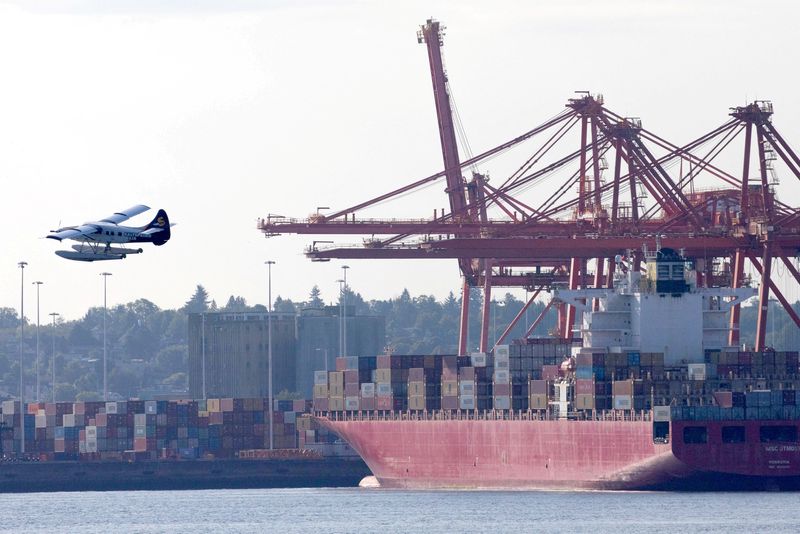Canada posts biggest trade deficit in almost three years, analyst predicts ‘rough summer’
2023.08.08 10:05

© Reuters. A float plane flies past containers and cranes at the Port of Vancouver, British Columbia, Canada, July 30, 2023. REUTERS/Chris Helgren/File Photo
By Ismail Shakil and David Ljunggren
OTTAWA (Reuters) -Canada’s trade deficit widened to C$3.73 billion ($2.77 billion) in June from May, the largest in nearly three years, as exports dropped 2.2%, outpacing an 0.5% decline in imports, Statistics Canada said on Tuesday.
Analysts in a Reuters poll had forecast a shortfall of C$2.90 billion. Statscan revised May’s deficit to C$2.68 billion from C$3.44 billion reported initially.
Meena Aier, head of Export Development Canada’s research and analysis department, said exporters faced challenges with high inflation as well as unfavorable cost and credit conditions.
“It’s probably going to be a rough July and a rough summer,” she said in a phone interview.
Canada’s trade deficit with countries other than the United States, its biggest trading partner, widened to an all-time high as month-over-month exports declined 5.5%, while imports were down marginally.
There were broad declines in exports in June, with metal and non-metallic mineral products being the largest drag.
“Weaker global demand and the fading boost from easing supply shortages took a toll on exports in June, confirming that net trade weighed on second-quarter GDP growth,” said Olivia Cross, assistant economist at Capital Economics.
Cross said slumping trade was likely to help pull second quarter annualized growth down to 1.2% from 3.7% in the first quarter, slightly above Statscan’s own estimate of 1%.
The 2.2% drop in exports followed a 3.0% decline in May. The overall trade deficit matched the C$3.73 billion shortfall in October 2020.
The Canadian dollar traded slightly higher at C$1.3477 to the U.S. dollar, or 74.20 U.S. cents, up from C$1.3498 to the U.S. dollar, or 74.09 U.S. cents.
Total exports fell 1.1% by volume, marking the 11th monthly drop in export prices in the past 12 months.
Total imports declined 0.5%, largely due to lower imports of energy products as well as pharmaceuticals. Imports of unwrought gold jumped, and nearly offset declines in other product categories. By volume, imports were up 0.9%.
Statscan said the impact of a 13-day strike by western Canadian dock workers was likely to be reflected in July data. It also said severe flooding in the province of Nova Scotia could have an impact.
($1 = 1.3453 Canadian dollars)








